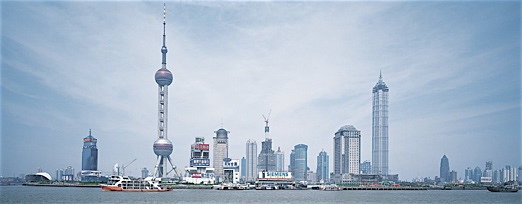Researchers learn that Large Is Smart when it comes to cities
Cities are considered by many to be a blessing
and a curse.

Cities are considered by many to be a blessing and a curse. Large cities generate
considerable wealth, they are home to many high paying jobs and are seen as
engines of innovation. But cities also generate pollution, crime and poor social
structures that lead to the urban blight that plagues their very
existence.
The old way of thinking about cities is as if they are an organism, which consumes resources and grows in size. Oftentimes, cities are referred to as its own ecosystem and many use the metaphor of it acting like a biological organism, Lobo said. But the team found that this was a false metaphor.
“In the case of cities, it is actually the opposite,” he added. “As cities get larger they create more wealth and they are more innovative at a faster rate. There is no counterpart to that in biology.” In fact, Lobo said, the larger the city the greater return on investment.
“The practical application of this work is that the problem is not large cities, the problem is the conditions in which some of the people live in large cities,” Lobo added. “Policies should be directed to making large cities more livable not making them smaller.”
“We are not saying that any large city is assured of prosperity forever, but if you look at the collection of cities, large cities have managed to outrun their problems,” Lobo added. “Large is smart.”
You can click into the abstract at the National Academy of Sciences site. There’s a link there to download the .pdf - just over 1mb.
Try to maintain a sense of time-scale while you read this. These guys are generally looking at the last 150 years of a city’s life. A worthwhile read to reflect upon if you are inclined to rely on science rather than politicians, pundits or priests for data-mining.
The old way of thinking about cities is as if they are an organism, which consumes resources and grows in size. Oftentimes, cities are referred to as its own ecosystem and many use the metaphor of it acting like a biological organism, Lobo said. But the team found that this was a false metaphor.
“In the case of cities, it is actually the opposite,” he added. “As cities get larger they create more wealth and they are more innovative at a faster rate. There is no counterpart to that in biology.” In fact, Lobo said, the larger the city the greater return on investment.
“The practical application of this work is that the problem is not large cities, the problem is the conditions in which some of the people live in large cities,” Lobo added. “Policies should be directed to making large cities more livable not making them smaller.”
“We are not saying that any large city is assured of prosperity forever, but if you look at the collection of cities, large cities have managed to outrun their problems,” Lobo added. “Large is smart.”
You can click into the abstract at the National Academy of Sciences site. There’s a link there to download the .pdf - just over 1mb.
Try to maintain a sense of time-scale while you read this. These guys are generally looking at the last 150 years of a city’s life. A worthwhile read to reflect upon if you are inclined to rely on science rather than politicians, pundits or priests for data-mining.
Posted: Thu - April 19, 2007 at 07:56 AM